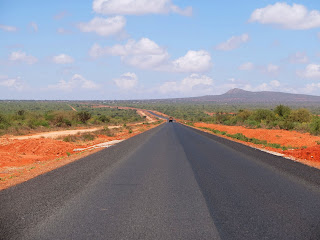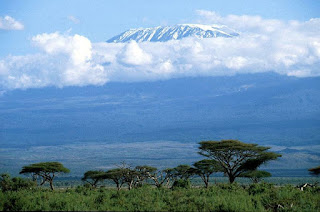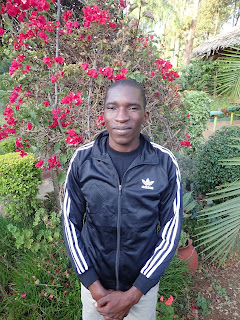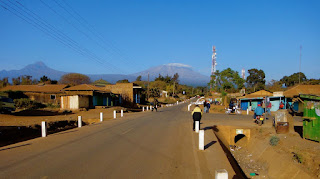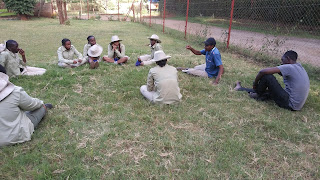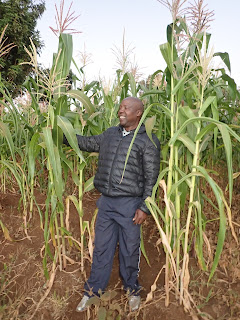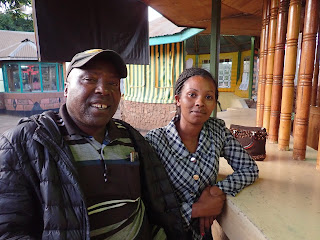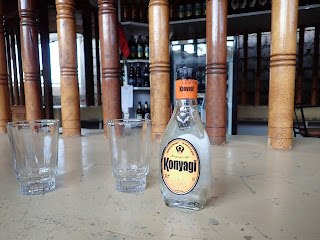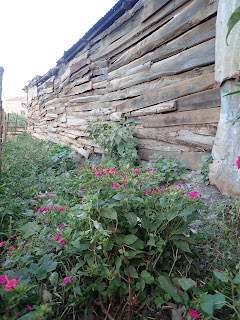Route C103 climbed out of the Tsavo plains towards Loitokitok. The two-laner was in better condition than most of the highways in New York City. Nathalia and the rest of the young people bonded with games and stories, as I peered out the bus window at the increasingly parched landscape.
“It was not always like this. There were trees. Many trees,” said Ma’we. The expert guide was ten years younger than me, but he had lived a long time in the last century. “Farmers cut down trees for charcoal. Goats ate the grass. The soil melted away with the wind. No one thinks they are to blame and fight for water.”
“It looks like East Wyoming. Flat, dry and hot. I hitchhiked through that plain in the summer of 1974. It’s even drier now.”
“Nothing stays the same.”
“Especially us.”
“Hakuna matata,” said Papa from the front and he turned up the radio. Steve and Jackman clapped their hands to the music and the rest of the group joined in time. We were becoming good travel companions.
Route C103 topped a rise and a massive mountain topped with snow rose over the plain.
“Kilimanjaro.”
The young people scootered forward for a better view. None of them had seen a mountain this high.
I hadn’t seen one since 1995 in Nepal.
“In Classic times Aeschylus and Herodutus had written about ‘an Egypt nurtured by the snows’.” My words were lost of them and I added, “We will be atop that mountain in three weeks.”
Everyone slapped five. I thought about my sisters’ worries and staring at Kilimanjaro I understood their concerns. 19,000 feet was 850 times taller than me.
“Some people thought it was the source of the Nile.” I struck out once more. No schools taught geography in the Internet age. Most people were where they were without any concern about where anything else was on the face of the Earth.
JM had been a teacher and said, “Two Englishmen came here to find the source of the Nile. Speke and Burton. They walked from Zanzibar. They did not get far.”
“The explorers were attacked by Somali bandits. A dog barked at attackers, alerting the white men to the threat. Still it was 200 versus 8. Speke was captured by the thieves. Burton was stuck in the mouth with a spear. One white man died in the fight. They were lucky to not have been wiped out, but
“This land was difficult for Mzunggus.” JM nodded looking at me. “Several years later the two set off once more across Tanzania. Like Ma’we said they discovered lakes and disease. Nothing more.”
“Not the source of the mighty Nile?” asked Steve, a native of Kibera.
“Only a guess by Speke and he was right. Lake Victoria was the source of the Nile.”
“From the Kagera River.” Jackman’s tribe came from that distant region and shined a ‘I know my shit’ smile.
My cellphone had no service. I couldn’t Google ‘Kagera River’, but my mind’s eye envisioned a strong brown river. Jackman exchanged glance with Ma’we. They grinned in victory and I nodded in surrender, because the best way of learning was to admit your ignorance.
I looked up at Kilimanjaro. A thin band of snow topped the volcano’s cone. Climate experts predicted the complete disappearance of the glacier in twenty years. The world was changing fast and no one in government either here or the West or East was interested in stomping the brakes on rampant capitalism, but I said nothing as we approached Loitokitok, our staging ground for the next three weeks and I said, “This town is as high as Mount Washington. 1600 meters.”
“Not very tall,” mocked Ma’we
“Not that all, but Mount Washington is a brutal place in the winter. The wind can blow at 300 kph. The cold drops below -40 Centigrade for days.”
Ma’we flashed a warning glare to stop my rant on danger. Young people scared easy, especially if what you said sounded like the truth.
“But most of the time it is easy to climb.”
Ma’we and JM nodded to acknowledge my understanding their expertise.
We passed through the police checkpoint and turned left onto a dirt road, then another left down a rougher path.
A sign announced our arrival at the Kibo Slopes Guest House.
A Maasiii guard stood at the gate.
“Marran,” murmured JM, as if only a fool messed with the tribal warriors.
I saluted the guard. He saluted back with respect.
The setting was idyllic and I divined the group was happy to be here.
So was I.
It was not winter in Brooklyn.
After unloading the van the group sat with JM, who explained, “Tonight is our last free night. Tomorrow we wake at 5:55am.”
I looked at Ma’we.
“Not you. You Mzee. Old man need sleep. C’mon I want to introduce you to someone.”
Ma’we led me into town along a dirt path. He warned of motorcycles.
“Always stand to the side and then do not move or else the driver becomes confused and you would not like to be hit by a motorcycle.”
“No, I wouldn’t.” I had fallen off enough motorbikes to understand the painful impact of metal with flesh.
The sun disappeared behind a cloud. I had expected Africa to be hot. Loitokitok was cool as a summer day in Maine. We reached the main road. Most people were walking home. I didn’t know where we were going, but I had a good idea.
Everyone in Loitokitok seemed to know Ma’we. He had a good laugh.
“I taught school here. I have climbed Kili almost a hundred times. Maybe more. My farm is twenty miles from here.” He waved to some church ladies. Kenya was very religious everyday of the week and twenty-four hours a day. Churches were everywhere, but Ma’we and I worshipped a different God and we ended up in the Golan Heights bar.
He ordered a bottle a Konyagi and a bottle of Crest soda.
“You know this?”
“No, but I bet I will soon enough.”
There was no ice, but you don’t need ice in Africa. Not unless you are a fool and Konyagi was good fun and nothing more. Especially with Ma’we. We toasted Kenyatta, Kennedy, and Kilimanjaro.
From now on we were on our feet.
I called Tim Challen in Geneva, as we walked back to the Kibo Slopes Guesthouse. My friend said it was cold and raining, then asked where I was.
“Not in a church.”
“Are you with Ma’we?”
I never lie and said yes.
“Konyagi?”
“Just a little.” I felt as good as I have in years. The ringing in my ears was gone. “The altitude has cured my ills. Thanks for having me on this trip.”
“My pleasure.”
I hung up and we continued to the guesthouse.
Happy to be here. Happy to be together. Happy to be in the dusk of Africa.
XMca6gOQctI/AAAAAAAArxI/BSbT9pwC8Dsd3wwmAEMojqMEojZf19OkwCLcBGAs/s1600/maxresdefault.jpg” imageanchor=”1″ style=”margin-left: 1em; margin-right: 1em;”>
Route C103 climbed out of the Tsavo plains towards Loitokitok. The two-laner was in better condition than most of the highways in New York City. Nathalia and the rest of the young people bonded with games and stories, as I peered out the bus window at the increasingly parched landscape.
“It was not always like this. There were trees. Many trees,” said Ma’we. The expert guide was ten years younger than me, but he had lived a long time in the last century. “Farmers cut down trees for charcoal. Goats ate the grass. The soil melted away with the wind. No one thinks they are to blame and fight for water.”
“It looks like East Wyoming. Flat, dry and hot. I hitchhiked through that plain in the summer of 1974. It’s even drier now.”
“Nothing stays the same.”
“Especially us.”
“Hakuna matata,” said Papa from the front and he turned up the radio. Steve and Jackman clapped their hands to the music and the rest of the group joined in time. We were becoming good travel companions.
Route C103 topped a rise and a massive mountain topped with snow rose over the plain.
“Kilimanjaro.”
The young people scootered forward for a better view. None of them had seen a mountain this high.
“In Classic times Aeschylus and Herodutus had written about ‘an Egypt nurtured by the snows’.” My words were lost of them and I added, “We will be atop that mountain in three weeks.”
Everyone slapped five. I thought about my sisters’ worries and staring at Kilimanjaro I understood their concerns. 19,000 feet was 850 times taller than me.
“Some people thought it was the source of the Nile.” I struck out once more. No schools taught geography in the Internet age. Most people were where they were without any concern about where anything else was on the face of the Earth.
JM had been a teacher and said, “Two Englishmen came here to find the source of the Nile. Speke and Burton. They walked from Zanzibar. They did not get far.”
“The explorers were attacked by Somali bandits. A dog barked at attackers, alerting the white men to the threat. Still it was 200 versus 8. Speke was captured by the thieves. Burton was stuck in the mouth with a spear. One white man died in the fight. They were lucky to not have been wiped out, but
“This land was difficult for Mzunggus.” JM nodded looking at me. “Several years later the two set off once more across Tanzania. Like Ma’we said they discovered lakes and disease. Nothing more.”
“Not the source of the mighty Nile?” asked Steve, a native of Kibera.
“Only a guess by Speke and he was right. Lake Victoria was the source of the Nile.”
“From the Kagera River.” Jackman’s tribe came from that distant region and shined a ‘I know my shit’ smile.
My cellphone had no service. I couldn’t Google ‘Kagera River’, but my mind’s eye envisioned a strong brown river. Jackman exchanged glance with Ma’we. They grinned in victory and I nodded in surrender, because the best way of learning was to admit your ignorance.
I looked up at Kilimanjaro. A thin band of snow topped the volcano’s cone. Climate experts predicted the complete disappearance of the glacier in twenty years. The world was changing fast and no one in government either here or the West or East was interested in stomping the brakes on rampant capitalism, but I said nothing as we approached Loitokitok, our staging ground for the next three weeks and I said, “This town is as high as Mount Washington. 1600 meters.”
“Not very tall,” mocked Ma’we
“Not that all, but Mount Washington is a brutal place in the winter. The wind can blow at 300 kph. The cold drops below -40 Centigrade for days.”
Ma’we flashed a warning glare to stop my rant on danger. Young people scared easy, especially if what you said sounded like the truth.
“But most of the time it is easy to climb.”
Ma’we and JM nodded to acknowledge my understanding their expertise.
We passed through the police checkpoint and turned left onto a dirt road, then another left down a rougher path.
A sign announced our arrival at the Kibo Slopes Guest House.
A Masaii guard stood at the gate.
“Marrans,” murmured JM, as if only a fool messed with the tribal warriors.
I saluted the guard. He saluted back with respect.
The setting was idyllic and I divined the group was happy to be here.
So was I.
It was not winter in Brooklyn.
After unloading the van the group sat with JM, who explained, “Tonight is our last free night. Tomorrow we wake at 5:55am.”
I looked at Ma’we.
“Not you. You Mzee. Old man need sleep. C’mon I want to introduce you to someone.”
Ma’we led me into town along a dirt path. He warned of motorcycles.
“Always stand to the side and then do not move or else the driver becomes confused and you would not like to be hit by a motorcycle.”
“No, I wouldn’t.” I had fallen off enough motorbikes to understand the painful impact of metal with flesh.
The sun disappeared behind a cloud. I had expected Africa to be hot. Loitokitok was cool as a summer day in Maine. We reached the main road. Most people were walking home. I didn’t know where we were going, but I had a good idea.
Everyone in Loitokitok seemed to know Ma’we. He had a good laugh.
“I taught school here. I have climbed Kili almost a hundred times. Maybe more. My farm is twenty miles from here.” He waved to some church ladies. Kenya was very religious everyday of the week and twenty-four hours a day. Churches were everywhere, but Ma’we and I worshipped a different God and we ended up in the Golan Heights bar.
He ordered a bottle a Konyagi and a bottle of Crest soda.
“You know this?”
“No, but I bet I will soon enough.”
There was no ice, but you don’t need ice in Africa. Not unless you are a fool and Konyagi was good fun and nothing more. especially with Ma’we. We toasted Kenyatta, Kennedy, and Kilimanjaro.
From now on we were on our feet.
I called Tim Challen in Geneva, as we walked back to the Kibo Slopes Guesthouse. My friend said it was cold and raining, then asked where I was.
“Not in a church.”
“Are you with Ma’we?”
I never lie and said yes.
“Konyagi?”
“Just a little.” I felt as good as I have in years. The ringing in my ears was gone. “The altitude has cured my ills. Thanks for having me on this trip.”
“My pleasure.”
I hung up and we continued to the guesthouse.
Happy to be here. Happy to be together. Happy to be held by the dusk of Africa.


